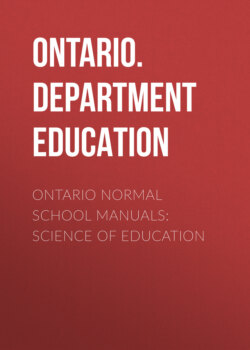Читать книгу Ontario Normal School Manuals: Science of Education - Ontario. Department of Education - Страница 7
На сайте Литреса книга снята с продажи.
WORTH IN HUMAN LIFE
ОглавлениеTable of Contents
But the possession of an intellectual and moral nature which responds to appropriate stimulations implies, also, that as man develops intellectually, he will find meaning in human life as realized in himself and others. Thus he becomes able to recognize worth in human life and to determine the conditions which favour its highest growth, or development.
The Worthy Life not a Natural Growth.—Granting that it is thus possible to recognize that "life is not a blank," but that it should develop into something of worth, it by no means follows that the young child will adequately recognize and desire a worthy life, or be able to understand and control the conditions which make for its development. Although, indeed, there is implanted in his nature a spiritual tendency, yet his early interests are almost wholly physical and his attitude impulsive and selfish. Left to himself, therefore, he is likely to develop largely as a creature of appetite, controlled by blind passions and the chance impressions of the moment. Until such time, therefore, as he obtains an adequate development of his intellectual and moral life, his behaviour conforms largely to the wants of his physical nature, and his actions are irrational and wasteful. Under such conditions the young child, if left to himself to develop in accordance with his native tendencies through the chance impressions which may stimulate him from without, must fall short of attaining to a life of worth. For this reason education is designed to control the growth, or development, of the child, by directing his stimulations and responses in such a way that his life may develop into one of worth.
Character of the Worthy Life.—If, however, it is possible to add to the worth of the life of the child by controlling and modifying his natural reactions, the first problem confronting the scientific educator is to decide what constitutes a life of worth. This question belongs primarily to ethics, or the science of right living, to which the educator must turn for his solution. Here it will be learned that the higher life is one made up of moral relations. In other words, the perfect man is a social man and the perfect life is a life made up of social rights and duties, wherein one is able to realize his own good in conformity with the good of others, and seek his own happiness by including within it the happiness of others. But to live a life of social worth, man must gain such control over his lower physical wants and desires that he can conform them to the needs and rights of others. He must, in other words, in adapting himself to his social environment, develop a sense of duty toward his fellows which will cause him to act in co-operation with others. He must refuse, for instance, to satisfy his own want by causing want to others, or to promote his own desires by giving pain to others. Secondly, he must obtain such control over his physical surroundings, including his own body, that he is able to make these serve in promoting the common good. In the worthy life, therefore, man has so adjusted himself to his fellow men that he is able to co-operate with them, and has so adjusted himself to his physical surroundings that he is able to make this co-operation effective, and thus live a socially efficient life.
